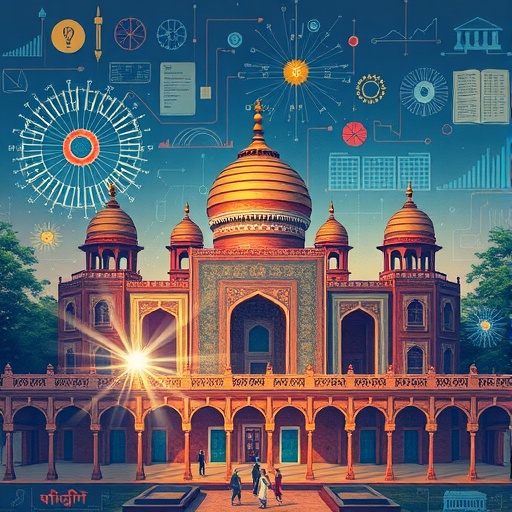In a transformative new study, researchers M. Rehman, M.A. Dar, and I. Rasool have conducted a systematic review concerning the state of AI literacy in higher education, aligning with India’s ambitious vision for the future, known as Viksit Bharat 2047. This comprehensive analysis serves as a critical examination of how well-equipped Indian higher education institutions are to prepare students for an increasingly AI-driven world. The authors argue that artificial intelligence literacy is not just an optional skill but a fundamental requirement for the workforce of tomorrow.
As the demand for AI proficiency soars across various industries, the educational landscape must evolve to meet these needs. The authors highlight the criticality of integrating AI education into university curricula, pointing out that students must not only understand AI’s capabilities but also its ethical, social, and economic implications. The idea is to foster a generation of graduates who are not only proficient in AI technologies but are also capable of navigating the nuanced realities these technologies introduce into society.
One key finding of the study reveals significant gaps within the current educational framework that hinder the effective teaching of AI principles. Many institutions lack the necessary resources, including access to advanced technology and qualified instructors, to provide a comprehensive AI education. The research suggests that universities must prioritize investments in infrastructure and faculty that can drive quality AI literacy programs, thereby aligning with the objectives of Viksit Bharat 2047.
Moreover, the authors emphasize the importance of collaboration among various stakeholders in the education sector. Partnerships between universities, tech companies, and policymakers are deemed essential to create a robust AI literacy ecosystem. This collaborative approach could facilitate internships, workshops, and mentorships that allow students to engage with real-world AI applications, deepening their understanding beyond theoretical knowledge.
The study also delves into the importance of an interdisciplinary approach to AI education. By integrating AI literacy into diverse fields such as arts, humanities, and social sciences, institutions can enhance the applicability of AI knowledge. This holistic angle encourages students from various backgrounds to learn how to harness AI tools effectively within their specific domains, thereby promoting creativity and innovation.
Importantly, the researchers highlight the role of policy in shaping AI education. They advocate for the government to develop and implement policies that not only encourage the adoption of AI curricula but also ensure equitable access to such education across urban and rural institutions. The goal is to democratize AI knowledge, ensuring that all students, regardless of their background, can benefit from the opportunities that AI presents.
As India aspires to achieve its Viksit Bharat 2047 vision, the role of AI in economic growth and societal advancement cannot be overstated. The authors argue that fostering AI literacy will contribute to a skilled workforce capable of driving innovation and competitiveness on a global scale. This aligns with India’s broader objectives of becoming a leading player in the digital transformation sector.
Furthermore, the emotional and psychological impacts of AI technology on society also deserve attention. As AI systems become more ingrained in daily life, understanding their ethical ramifications is paramount. The study calls for cultivating a sense of responsibility among students to think critically about the implications of AI technologies they may one day develop or utilize.
The researchers also propose that universities create curricula that are agile and adaptable to the fast-evolving nature of AI technology. Regular updates to course materials and teaching methods are necessary to reflect the latest advancements in AI. This flexibility ensures that educational offerings remain relevant and prepare students for future challenges and opportunities.
One compelling aspect of the research is its forward-looking approach, urging educational institutions not to wait until extensive AI adoption occurs in various sectors before updating their programs. Instead, the call to action focuses on proactive measures that will place AI literacy at the forefront of educational priorities. Early integration of AI into the curriculum can empower the next generation of innovators to lead the charge in various industries.
In conclusion, Rehman, Dar, and Rasool’s systematic review presents a compelling case for the urgent need for AI literacy in higher education. By addressing the identified gaps and emphasizing a collaborative, interdisciplinary approach, there exists the potential to transform educational pathways and better prepare students for a technologically advanced future. The integration of AI literacy not only aligns with Viksit Bharat 2047 but also lays the groundwork for a more informed, ethical, and capable society, ready to embrace the full spectrum of technological evolution. This study serves as both a roadmap and a call to action for all stakeholders involved in shaping the future of education in India.
Subject of Research: AI Literacy in Higher Education in India
Article Title: AI literacy at higher education and India’s vision Viksit Bharat 2047: a systematic review
Article References:
Rehman, M., Dar, M.A. & Rasool, I. AI literacy at higher education and India’s vision Viksit Bharat 2047: a systematic review.
Discov Artif Intell 5, 294 (2025). https://doi.org/10.1007/s44163-025-00348-z
Image Credits: AI Generated
DOI: 10.1007/s44163-025-00348-z
Keywords: AI literacy, higher education, India, Viksit Bharat, education reform, interdisciplinary learning, ethical AI, policy development.
Tags: AI literacy in higher educationartificial intelligence curriculum integrationchallenges in teaching AI principlesethical implications of AI educationevolving educational landscape for AIfuture skills in an AI-driven worldgaps in AI educational resourcesIndia’s educational reformqualified instructors for AI trainingsocial impact of AI technologiesViksit Bharat 2047 initiativeworkforce readiness for AI





